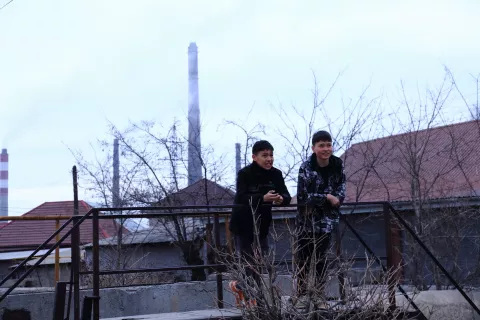UNICEF and WHO: Every dollar spent on Primary Health Care returns 16 USD
The Ministry of Health, WHO and UNICEF conduct a Round table on Primary Health Care Financing in Kyrgyzstan.

BISHKEK, 12 April 2023 – Today, the Deputy Minister of Health, Dr Bakyt Dzhangaziev, the Special Representative of the WHO Regional Director in the Kyrgyz Republic, Dr. Shahin Huseynov, and UNICEF Representative in Kyrgyzstan, Ms Christine Jaulmes, led the discussion on strengthening Primary Health Care (PHC) for achieving health-related Sustainable Development Goal during the Round table on PHC Financing. The participants called for increased investments in PHC to reduce overall healthcare costs such as hospital-based and tertiary-level care.
Primary health care is widely recognized as a cornerstone to achieving Universal Health Coverage (UHC) and Health For All. There are high economic returns on investment in PHC, as demonstrated by the recent PHC Costing exercise in Maldives supported by UNICEF, with a return on investment in PHC at 16 USD for every dollar spent. The same is true for return on investment in antenatal, postnatal and child health care.
“In Kyrgyzstan, Primary Health Care is one of the priorities. It is prioritized in the health strategy for 2019–2030 “Healthy person – prosperous country”, which aims to protect health and ensure access of the population to essential quality services. Primary health care system provides universal comprehensive access to the full range of medical services that people need for their health and well-being, thereby increasing their level of coverage and financial protection”, stated Dr Bakyt Dzhangaziev, the Deputy Minister of Health.
The WHO-recommended policy options to strengthen PHC financing based on international evidence aim at improving health outcomes and increasing the value for money of public spending. According to Dr. Shahin Huseynov, the Special Representative of the WHO Regional Director in the Kyrgyz Republic, "Kyrgyzstan, with WHO support, has been continuously making efforts to grant universal access to basic PHC services for the entire population. Realistic and sustainable financing is a key enabling factor to make PHC strong for fulfilling its gate-keeper role of the integrated people-centred health service delivery system in Kyrgyzstan.”
WHO recommends strengthening PHC financing by reviewing the PHC benefit package, which needs to be better aligned with population health needs and the available level of public funding. WHO also suggests redesigning PHC providers’ payment system and improving monitoring mechanisms. Additionally, the PHC organizational model needs to be enhanced to increase equity and efficiency.
“UNICEF conducted an assessment to reduce the cost of health services for patients and make them more affordable for low‐income families. Interestingly, preliminary results of the investment case in PHC for Kyrgyzstan suggest that an investment cost of 0.33 per cent of the Gross Domestic Product (GDP) over 20 years would generate economic benefits valued at 2.9 per cent of the GDP over the same period. UNICEF appreciates the Ministry of Health leadership in ensuring equitable access to health for all citizens,”, said Christine Jaulmes, UNICEF Representative in Kyrgyzstan.
Media contacts
About UNICEF
UNICEF promotes the rights and wellbeing of every child, in everything we do. Together with our partners, we work in 190 countries and territories to translate that commitment into practical action, focusing special effort on reaching the most vulnerable and excluded children, to the benefit of all children, everywhere.
For more information about UNICEF and its work for children, visit www.unicef.org.




